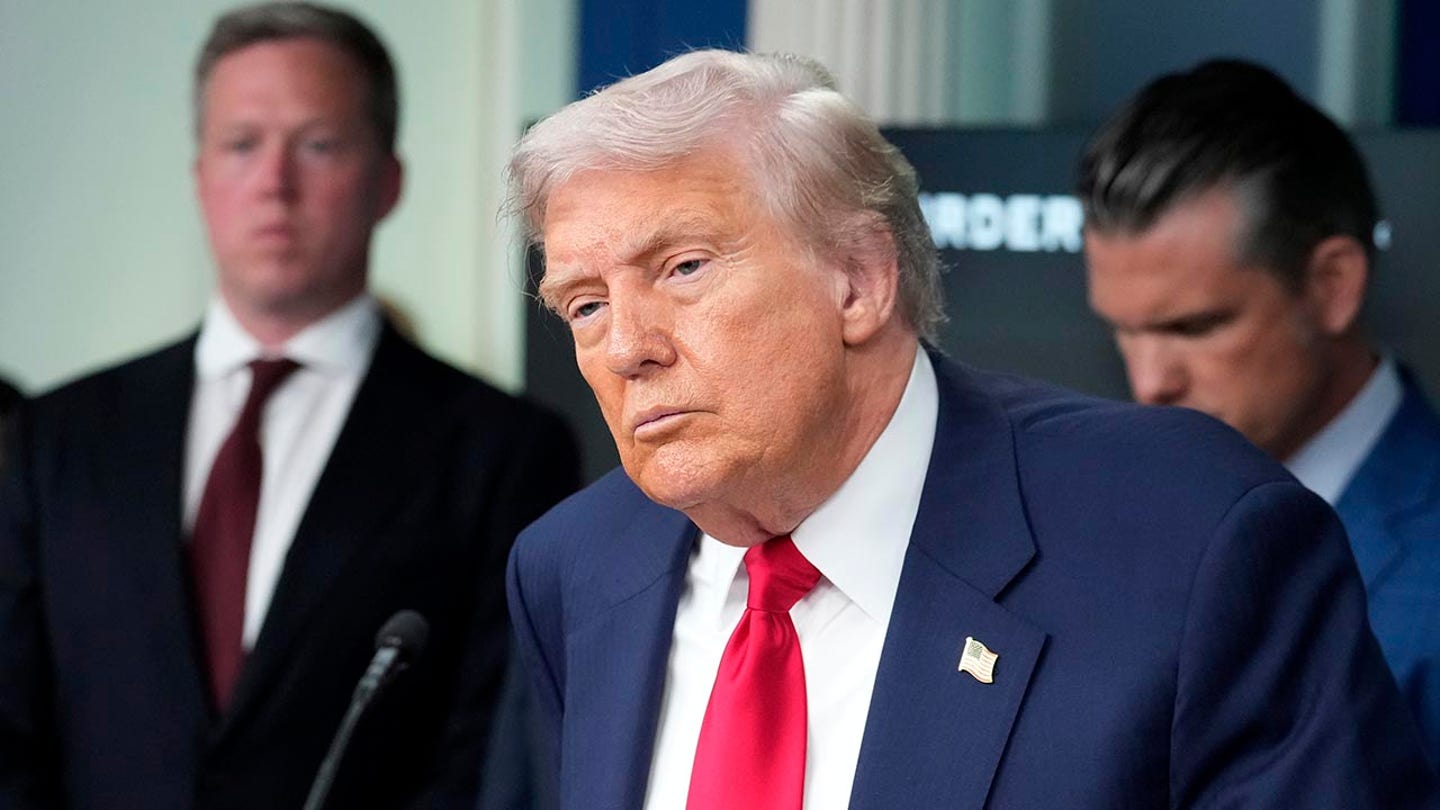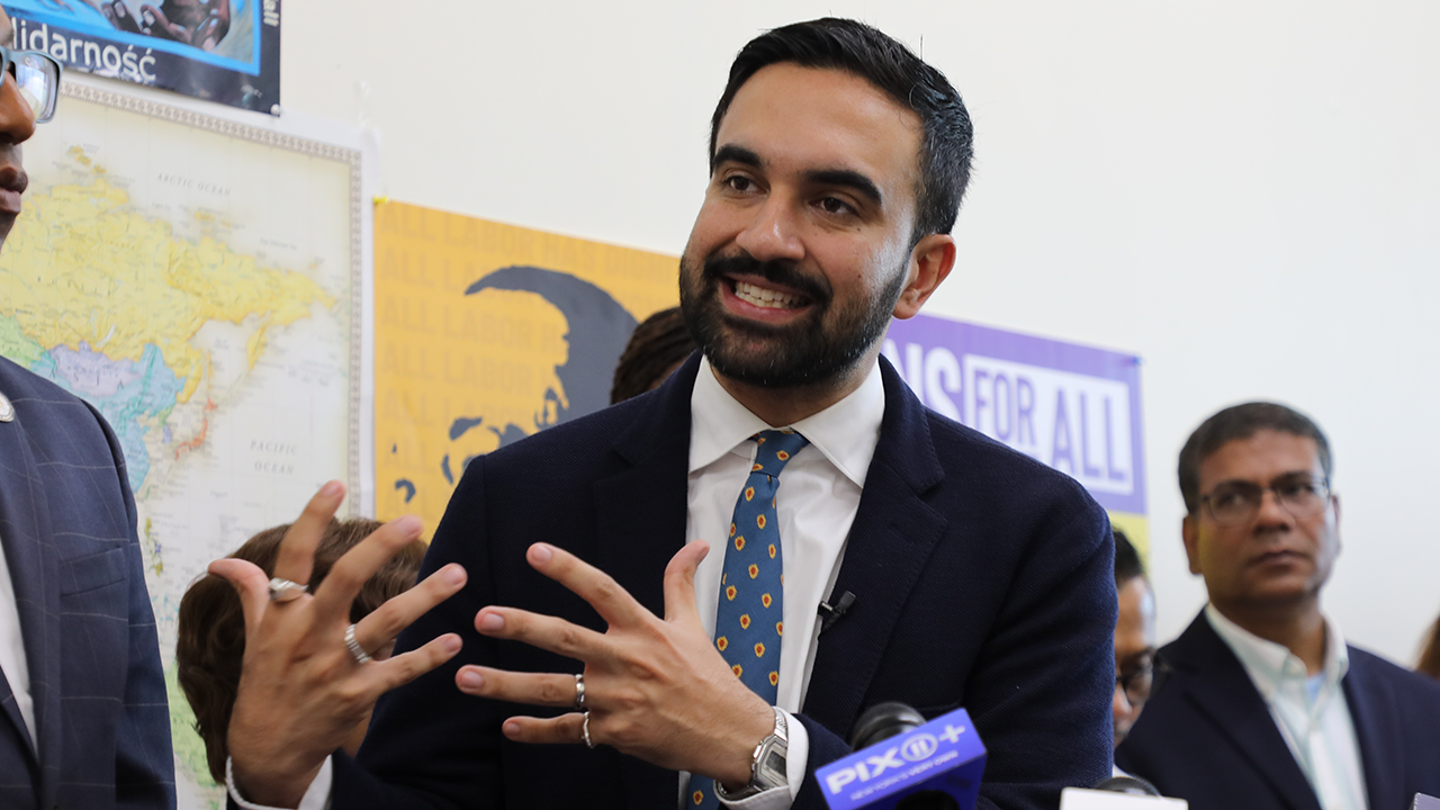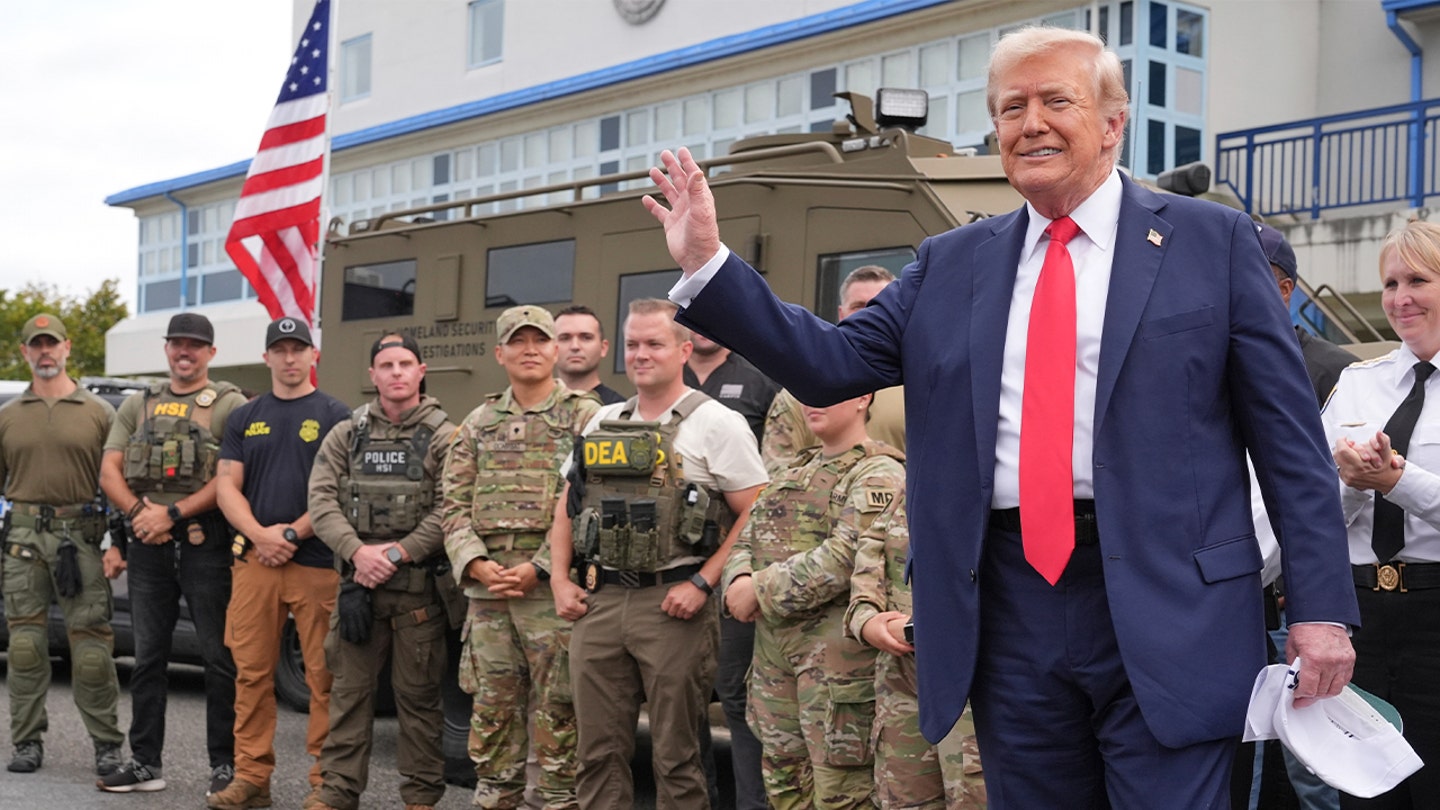
Wanted Olympian-turned-fugitive Ryan Wedding in custody, sources say
Entities mentioned:
- Ryan Wedding: Self-preservation, Power, Greed
- Pam Bondi: Justice, Recognition, Professional pride
- Kash Patel: Duty, Justice, Professional pride
- Donald Trump: Power, Legacy, Recognition
- FBI: Justice, Duty, Professional pride
Article Assessment:
Credibility Score: 75/100
Bias Rating: 65/100 (Lean Right)
Sentiment Score: 70/100
Authoritarianism Risk: 35/100 (Generally Democratic)
Bias Analysis:
The article leans right due to its positive framing of Trump administration policies and emphasis on law enforcement victories. It primarily presents the government's perspective without significant counterbalancing views.
Key metric: Crime Rate
Let me tell you something, folks - this is a GAME-CHANGING play in the war on drugs! Ryan Wedding, once an Olympic snowboarder, thought he could outmaneuver the law, but he just got BODY-CHECKED by the FBI's defensive line! This cocaine kingpin tried to go for the gold in the criminal underworld, but now he's facing a MAJOR PENALTY! The Trump administration is playing OFFENSE, folks, and they're not letting these criminals run out the clock! With Wedding's capture, that's SIX Most Wanted Fugitives taken down in a year - talk about a WINNING STREAK! The FBI, coached by Director Patel, is showing true CHAMPIONSHIP MENTALITY, refusing to let these fugitives escape the long arm of the law. This is what happens when you let good cops play their positions - they DOMINATE THE FIELD! Wedding thought he was untouchable in his Mexican hideout, but he just got SACKED by a team effort between U.S. and Mexican authorities. Now he's been extradited back to face the music - game over, Wedding!

Fugitive Olympic snowboarder faces new accusations as feds raise reward for his capture to $15M
Entities mentioned:
- Ryan Wedding: Power, Greed, Self-preservation
- FBI: Justice, Duty, Determination
- Kash Patel: Duty, Justice, Competitive spirit
- Pam Bondi: Justice, Duty, Righteousness
Article Assessment:
Credibility Score: 75/100
Bias Rating: 55/100 (Center)
Sentiment Score: 30/100
Authoritarianism Risk: 35/100 (Generally Democratic)
Bias Analysis:
The article presents a balanced view of the case, quoting multiple officials and providing background information. While it focuses on law enforcement's perspective, it doesn't overtly editorialize.
Key metric: Drug Trafficking and Crime Rate
Let me tell you something - this is a CHAMPIONSHIP-LEVEL SHOWDOWN between law enforcement and a rogue Olympian turned drug lord! Ryan Wedding has gone from carving up the slopes to carving up a criminal empire, but the FBI is bringing their A-game to take him down. This is a high-stakes matchup, folks! Wedding thought he could outmaneuver the justice system, but he's about to face a full-court press from the feds. The FBI is pulling out all the stops, raising the bounty to a whopping $15 million - that's like offering a record-breaking contract to land the league's MVP! They're treating this fugitive chase like it's the Super Bowl of law enforcement, and they won't rest until they've sacked this snowboarding kingpin. It's fourth and long for Wedding, and the clock is ticking. The feds are blitzing from all angles, determined to tackle this international narco-trafficking network. This is the kind of full-throttle pursuit that separates the champions from the also-rans. Mark my words, folks - this is going to be one for the record books!

81% of Americans see crime as a 'major problem' in big cities, new poll shows
Entities mentioned:
- Donald Trump: Power, Control, Recognition
- American Public: Security, Fear, Justice
- Pam Bondi: Duty, Professional pride, Control
- Iris Tao: Security, Self-preservation, Recognition
- Anna Giaritelli: Justice, Security, Moral outrage
- Gregg Pemberton: Professional pride, Security, Control
Article Assessment:
Credibility Score: 65/100
Bias Rating: 75/100 (Lean Right)
Sentiment Score: 30/100
Authoritarianism Risk: 70/100 (Authoritarian Tendencies)
Bias Analysis:
The article leans right, evidenced by its focus on Trump's actions and positive framing of his crime policies. It predominantly features perspectives supporting Trump's approach, with limited counterbalancing views.
Key metric: Crime Rate
As a social scientist, I analyze that this article highlights a significant public concern over crime rates in major US cities, with a strong emphasis on the Trump administration's approach to law enforcement. The poll data suggests widespread anxiety about crime across political affiliations, though with varying levels of support for Trump's methods. The personal anecdotes and support from law enforcement officials reinforce the narrative of a crime crisis, potentially influencing public perception and policy decisions. The federalization of local police forces represents a significant shift in crime-fighting strategy, which could have far-reaching implications for federal-state relations and civil liberties.

Following LA and DC, Trump wants to send the National Guard to other US cities. Here’s how he can do it
Entities mentioned:
- Donald Trump: Power, Control, Influence
- Elizabeth Goitein: Justice, Duty, Professional pride
- Brandon Johnson: Righteousness, Duty, Indignation
- JB Pritzker: Righteousness, Duty, Indignation
- David Janovsky: Professional pride, Duty, Wariness
- Pam Bondi: Loyalty, Control, Influence
- Gavin Newsom: Righteousness, Duty, Self-preservation
Article Assessment:
Credibility Score: 75/100
Bias Rating: 40/100 (Lean Left)
Sentiment Score: 30/100
Authoritarianism Risk: 65/100 (Authoritarian Tendencies)
Bias Analysis:
The article leans slightly left, giving more space to critics of Trump's actions and framing the issue as a potential overreach of presidential power. However, it does include multiple perspectives and cites legal justifications for Trump's actions.
Key metric: Civil Liberties Protection Index
As a social scientist, I analyze that this article highlights a significant tension between federal and state powers, particularly concerning the use of military forces for domestic law enforcement. The proposed actions by the Trump administration represent a potential shift in the balance of power, raising concerns about civil liberties and the traditional separation of military and police functions. This situation could have far-reaching implications for federalism, constitutional interpretation, and the scope of presidential authority in domestic affairs. The legal challenges and pushback from state and local officials underscore the complexity of these issues and the potential for a constitutional crisis if federal forces are deployed against the wishes of state governments.

Trump threatens lawsuit over 'blue slips' as top GOP senator bucks demand to bend Senate rules for nominees
Entities mentioned:
- Donald Trump: Power, Control, Ambition
- Chuck Grassley: Duty, Professional pride, Loyalty
- Senate Democrats: Control, Competitive spirit, Influence
- Chuck Schumer: Power, Influence, Competitive spirit
- Cory Booker: Influence, Control, Loyalty
- Andy Kim: Influence, Control, Loyalty
- Alina Habba: Ambition, Power, Recognition
- Pam Bondi: Power, Control, Loyalty
Article Assessment:
Credibility Score: 75/100
Bias Rating: 55/100 (Center)
Sentiment Score: 35/100
Authoritarianism Risk: 65/100 (Authoritarian Tendencies)
Bias Analysis:
The article presents multiple viewpoints, including Trump's criticisms and Grassley's defenses. While it gives slightly more space to Trump's perspective, it balances this with context and opposing views, maintaining a relatively centrist position.
Key metric: Judicial Appointment Efficiency
As a social scientist, I analyze that this article highlights a significant conflict between the executive and legislative branches over the judicial appointment process. The 'blue slip' tradition, while not law, has become a point of contention that impacts the efficiency and partisan nature of judicial appointments. Trump's threat to sue over this practice indicates an escalation in the power struggle between the presidency and the Senate. This conflict has the potential to alter long-standing Senate traditions and could lead to increased polarization in the judicial nomination process. The resistance from Senator Grassley, a member of Trump's own party, demonstrates the complexity of this issue and the tension between party loyalty and institutional norms.

Mamdani reveals which Dem cities are 'model for how to fight' Trump admin in NYC
Entities mentioned:
- Zohran Mamdani: Righteousness, Moral outrage, Determination
- Donald Trump: Power, Control, Influence
- Andrew Cuomo: Ambition, Self-preservation
- Michelle Wu: Righteousness, Determination, Moral outrage
- Pam Bondi: Duty, Control
- Gavin Newsom: Ambition, Competitive spirit
- Claudia Sheinbaum: Sovereignty, Pride
- Abigail Jackson: Loyalty, Competitive spirit
Article Assessment:
Credibility Score: 65/100
Bias Rating: 35/100 (Lean Left)
Sentiment Score: 30/100
Authoritarianism Risk: 45/100 (Mixed/Neutral)
Bias Analysis:
The article leans left in its framing, giving more space and favorable coverage to Democratic perspectives. While it includes a Republican response, the overall narrative emphasizes Democratic resistance to Trump policies.
Key metric: Political Polarization Index
As a social scientist, I analyze that this article highlights the growing political polarization in the United States, particularly between Democratic-led cities and the Republican federal administration. The confrontational stance of local leaders against federal policies indicates a deepening divide in governance approaches and ideologies. This conflict is likely to increase the Political Polarization Index, as it showcases a clear us-vs-them mentality in policy-making and implementation. The article presents a narrative of resistance and defiance from Democratic leaders, which could further entrench partisan positions and make compromise more difficult. The use of legal challenges, public statements, and policy implementations to counter federal initiatives suggests a complex interplay of federalism and party politics that is likely to intensify political divisions.

Trump’s DC takeover produces moderate drop in crime — and huge spike in immigration arrests
Entities mentioned:
- Donald Trump: Power, Control, Influence
- Metropolitan Police Department: Duty, Professional pride, Security
- ICE (Immigration and Customs Enforcement): Duty, Control, Righteousness
- Muriel Bowser: Loyalty, Justice, Self-preservation
- Abigail Jackson: Loyalty, Duty, Righteousness
- Pam Bondi: Duty, Loyalty, Control
- JD Vance: Loyalty, Influence, Power
Article Assessment:
Credibility Score: 75/100
Bias Rating: 45/100 (Center)
Sentiment Score: 35/100
Authoritarianism Risk: 65/100 (Authoritarian Tendencies)
Bias Analysis:
The article presents multiple viewpoints and cites various data sources, indicating an attempt at balanced reporting. However, there is slightly more emphasis on critical perspectives of the federal intervention, which may suggest a slight lean towards skepticism of the Trump administration's actions.
Key metric: Crime Rate
As a social scientist, I analyze that the federal takeover of Washington D.C.'s police force has resulted in a complex situation with mixed outcomes. While there has been a moderate decrease in overall crime rates, particularly in property crimes and some violent crimes, there has been a significant increase in immigration arrests. This suggests that the federal intervention may be prioritizing immigration enforcement over other types of crime prevention. The stark contrast between the modest crime reduction and the tenfold increase in immigration arrests indicates a shift in law enforcement priorities that may not align with local community needs or preferences. The article also highlights tensions between federal and local authorities, as well as concerns about potential data manipulation and the long-term implications of this federal intervention on local governance and community relations. The public's opposition to the takeover, as indicated by the poll, suggests a disconnect between federal actions and local sentiments, which could lead to decreased trust in law enforcement and potential social unrest.

Trump team keeps giving away the game on its retribution crusade
Entities mentioned:
- Donald Trump: Power, Revenge, Control
- John Bolton: Self-preservation, Duty, Professional pride
- Kash Patel: Loyalty, Ambition, Power
- Dan Bongino: Loyalty, Righteousness, Influence
- Pam Bondi: Loyalty, Power, Influence
- Christopher Wray: Duty, Professional pride, Wariness
- Merrick Garland: Duty, Justice, Professional pride
- Ed Martin: Loyalty, Ambition, Influence
- Letitia James: Justice, Ambition, Recognition
- James Boasberg: Duty, Justice, Professional pride
- James Comey: Self-preservation, Justice, Indignation
- Tulsi Gabbard: Loyalty, Ambition, Influence
- Kristi Noem: Loyalty, Ambition, Power
- Elon Musk: Power, Influence, Recognition
Article Assessment:
Credibility Score: 75/100
Bias Rating: 35/100 (Lean Left)
Sentiment Score: 25/100
Authoritarianism Risk: 70/100 (Authoritarian Tendencies)
Bias Analysis:
The article leans left in its framing, focusing primarily on criticisms of the Trump administration's actions. While it presents factual information, the selection and emphasis of events paint a negative picture of Trump and his allies, with less attention to counterarguments.
Key metric: Rule of Law Index
As a social scientist, I analyze that this article highlights a concerning trend in the politicization of the US justice system under the Trump administration. The repeated instances of public officials making prejudicial statements about ongoing investigations, targeting political opponents, and disregarding established norms of prosecutorial conduct suggest a significant erosion of the traditional separation between politics and justice. This behavior risks undermining public trust in legal institutions and the impartial application of law, which are crucial components of the Rule of Law Index. The contrast drawn between the handling of investigations into Trump's opponents versus those into Trump himself further emphasizes this disparity, potentially leading to a perception of a two-tiered justice system based on political allegiance.

Trump's week shaped by crime agenda, potential guard deployment to Chicago
Entities mentioned:
- Donald Trump: Power, Control, Influence
- Pam Bondi: Duty, Justice, Professional pride
- Brandon Johnson: Self-preservation, Righteousness, Indignation
- J.B. Pritzker: Duty, Self-preservation, Wariness
- Wes Moore: Duty, Security, Cooperation
- Muriel Bowser: Duty, Security, Self-preservation
Article Assessment:
Credibility Score: 70/100
Bias Rating: 55/100 (Center)
Sentiment Score: 35/100
Authoritarianism Risk: 65/100 (Authoritarian Tendencies)
Bias Analysis:
The article presents multiple viewpoints, including Trump's statements and responses from Democratic leaders. While it leans slightly towards critiquing Trump's approach, it maintains a relatively balanced presentation of facts and perspectives.
Key metric: Crime Rate in Major Cities
As a social scientist, I analyze that this article highlights President Trump's focus on crime reduction in major U.S. cities, particularly Chicago and Washington D.C., through the potential deployment of National Guard troops and increased federal law enforcement presence. This approach reflects a centralized, federal-level intervention in local matters, which could impact crime rates but also raises concerns about federal overreach and political motivations. The President's rhetoric and actions suggest a belief that forceful intervention can quickly reduce crime, but this approach may overlook complex socio-economic factors contributing to urban crime. The resistance from local Democratic leaders indicates a political divide in approaches to public safety and federalism. This conflict could affect the implementation and effectiveness of crime reduction strategies, potentially impacting the key metric of crime rates in major cities.

‘Keeping it totally open’: Trump says he supports Justice Department sending Epstein files to House Oversight panel
Entities mentioned:
- Donald Trump: Self-preservation, Control, Influence
- Justice Department: Duty, Transparency, Justice
- House Oversight Committee: Justice, Transparency, Duty
- Jeffrey Epstein: Power, Control, Self-preservation
- Pam Bondi: Duty, Loyalty, Professional pride
- James Comer: Transparency, Justice, Duty
- Mike Johnson: Caution, Control, Political calculation
Article Assessment:
Credibility Score: 70/100
Bias Rating: 55/100 (Center)
Sentiment Score: 45/100
Authoritarianism Risk: 30/100 (Generally Democratic)
Bias Analysis:
The article presents multiple perspectives, including Trump's views and the committee's approach, indicating an attempt at balanced reporting. However, the inclusion of Trump's 'Democrat hoax' comment without immediate fact-checking slightly tilts the narrative.
Key metric: Government Transparency and Accountability
As a social scientist, I analyze that this article highlights the complex interplay between government transparency, political motivations, and the protection of sensitive information. The release of the Epstein files represents a significant test of the balance between public interest and individual privacy. Trump's support for transparency, while simultaneously dismissing the issue as a 'Democrat hoax,' reveals the politicization of the matter. The House Oversight Committee's approach demonstrates a cautious stance, prioritizing victim protection while aiming for transparency. This situation impacts government accountability by potentially exposing connections between high-profile individuals and Epstein, which could have far-reaching political implications. The delay in releasing the files and the careful review process indicate the sensitive nature of the information and its potential to affect public trust in institutions and political figures.